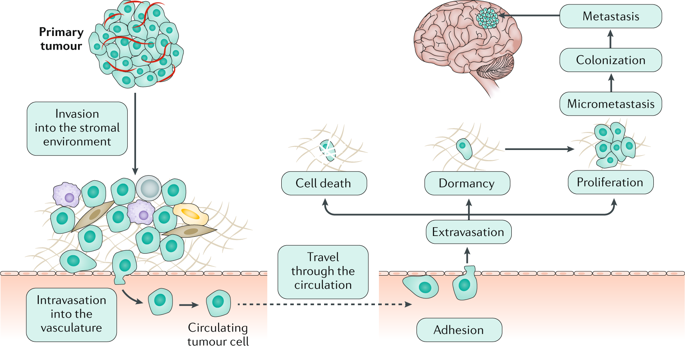Nature Reviews Disease Primers ( IF 76.9 ) Pub Date : 2019-01-17 , DOI: 10.1038/s41572-018-0055-y Achal Singh Achrol , Robert C. Rennert , Carey Anders , Riccardo Soffietti , Manmeet S. Ahluwalia , Lakshmi Nayak , Solange Peters , Nils D. Arvold , Griffith R. Harsh , Patricia S. Steeg , Steven D. Chang

|
An estimated 20% of all patients with cancer will develop brain metastases, with the majority of brain metastases occurring in those with lung, breast and colorectal cancers, melanoma or renal cell carcinoma. Brain metastases are thought to occur via seeding of circulating tumour cells into the brain microvasculature; within this unique microenvironment, tumour growth is promoted and the penetration of systemic medical therapies is limited. Development of brain metastases remains a substantial contributor to overall cancer mortality in patients with advanced-stage cancer because prognosis remains poor despite multimodal treatments and advances in systemic therapies, which include a combination of surgery, radiotherapy, chemotherapy, immunotherapy and targeted therapies. Thus, interest abounds in understanding the mechanisms that drive brain metastases so that they can be targeted with preventive therapeutic strategies and in understanding the molecular characteristics of brain metastases relative to the primary tumour so that they can inform targeted therapy selection. Increased molecular understanding of the disease will also drive continued development of novel immunotherapies and targeted therapies that have higher bioavailability beyond the blood–tumour barrier and drive advances in radiotherapies and minimally invasive surgical techniques. As these discoveries and innovations move from the realm of basic science to preclinical and clinical applications, future outcomes for patients with brain metastases are almost certain to improve.
中文翻译:

脑转移
估计所有癌症患者中有20%会发生脑转移,其中大多数脑转移发生在患有肺癌,乳腺癌和结肠直肠癌,黑素瘤或肾细胞癌的患者中。人们认为脑转移是通过将循环肿瘤细胞播种到脑微血管中而发生的。在这种独特的微环境中,肿瘤的生长得到了促进,全身药物的渗透受到了限制。脑转移的发展仍然是晚期癌症患者总体癌症死亡率的重要因素,因为尽管采取了多种形式的疗法和包括外科手术,放射疗法,化学疗法,免疫疗法和靶向疗法的组合在内的系统疗法取得了进步,但预后仍然很差。因此,人们对理解驱动脑转移的机制充满兴趣,以便可以采用预防性治疗策略作为目标,并了解相对于原发肿瘤的脑转移的分子特征,以便可以为靶向治疗提供信息。对疾病的分子了解的增加还将推动新型免疫疗法和靶向疗法的持续发展,这些疗法和生物疗法具有更高的生物利用度,超过血液-肿瘤屏障,并推动放射疗法和微创外科技术的发展。随着这些发现和创新从基础科学领域转移到临床前和临床应用,几乎可以肯定的是,脑转移患者的未来结局将有所改善。






























 京公网安备 11010802027423号
京公网安备 11010802027423号